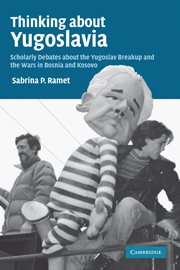 Thinking about Yugoslavia
Thinking about Yugoslavia Book contents
- Frontmatter
- Contents
- Preface
- List of books discussed
- Glossary
- 1 Debates about the war
- 2 The collapse of East European communism
- 3 The roots of the Yugoslav collapse
- 4 Who's to blame, and for what? Rival accounts of the war
- 5 Memoirs and autobiographies
- 6 The scourge of nationalism and the quest for harmony
- 7 Milošević's place in history
- 8 Dilemmas in post-Dayton Bosnia
- 9 Crisis in Kosovo/a (with Angelo Georgakis)
- 10 Debates about intervention
- 11 Lands and peoples: Bosnia, Croatia, Slovenia, Serbia
- 12 Southern republics: Macedonia and Montenegro in contemporary history
- 13 Conclusion: controversies, methodological disputes, and suggested reading
- Index
13 - Conclusion: controversies, methodological disputes, and suggested reading
Published online by Cambridge University Press: 22 September 2009
- Frontmatter
- Contents
- Preface
- List of books discussed
- Glossary
- 1 Debates about the war
- 2 The collapse of East European communism
- 3 The roots of the Yugoslav collapse
- 4 Who's to blame, and for what? Rival accounts of the war
- 5 Memoirs and autobiographies
- 6 The scourge of nationalism and the quest for harmony
- 7 Milošević's place in history
- 8 Dilemmas in post-Dayton Bosnia
- 9 Crisis in Kosovo/a (with Angelo Georgakis)
- 10 Debates about intervention
- 11 Lands and peoples: Bosnia, Croatia, Slovenia, Serbia
- 12 Southern republics: Macedonia and Montenegro in contemporary history
- 13 Conclusion: controversies, methodological disputes, and suggested reading
- Index
Summary
It is my hope that the foregoing chapters have provided some clarification of the nature of the debates within the field of Yugoslav and post-Yugoslav studies as well as concerning the differences in point of view among the various authors discussed. I have tried, to the extent of my knowledge and ability, to discuss those works which have had the greatest impact in the field and/or are the most deserving of attention. I have left to the side books which are best left to the side, though I hasten to point out that no survey of literature in a given field can ever hope to be complete and that no special meaning should be read into the exclusion of one or another book from discussion in the foregoing pages. What an alert reader will note at once is that scholars in the field of Yugoslav studies (and, of course, principals engaged in writing their memoirs) have some serious disagreements with each other and that these involve both substantive questions and questions related to research methodology.
Where substantive controversies are concerned, there are differences of opinion concerning when the conflict ‘really’ started – did it start, for example, somewhere between 1986 and 1991 as most scholars think, with 1991 being the ‘common sense’ view, or should one trace the conflict back in time?
- Type
- Chapter
- Information
- Thinking about YugoslaviaScholarly Debates about the Yugoslav Breakup and the Wars in Bosnia and Kosovo, pp. 305 - 318Publisher: Cambridge University PressPrint publication year: 2005


